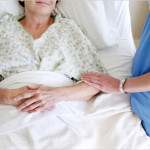April 2nd, 2012
What Would You Do?
Gopi Astik, MD
While combing through my social media outlets recently, I came across an article that struck me. The article entitled “Why Doctors Die Differently” addresses a subject many professionals in the medical field know but don’t really talk about — that physicians die too.
 The article explains how we, as physicians, understand the limits of medical therapy and procedures and often forego treatment when the end is near. It’s not that we are ready to die but that we understand the chances of surviving a cardiac arrest with complete neurologic function. We have seen the effects chemotherapy can have on patients and we sometimes think about quality more than quantity of life.
The article explains how we, as physicians, understand the limits of medical therapy and procedures and often forego treatment when the end is near. It’s not that we are ready to die but that we understand the chances of surviving a cardiac arrest with complete neurologic function. We have seen the effects chemotherapy can have on patients and we sometimes think about quality more than quantity of life.
This article presented itself to me at the perfect time. I had a patient who was a 40-year-old female survivor of cervical cancer who was then diagnosed with aggressive cholangiocarcinoma. She was admitted to my service with symptoms of dyspnea and hypoxia caused by a pulmonary embolus that developed because she stopped taking her lovenox. On presentation, she was cachectic, weak, and in obvious respiratory distress. She had recently been told by her oncologist that there were no more treatment options because of the spread of the cancer. The patient never actually spoke during her hospitalization, partly due to her dyspnea and partly because her very supportive and vocal family would not accept that their loved one could not be treated and wanted to try every possible procedure, medication, and therapy.
I had multiple conversations with this patient’s family, but one conversation with her mother will stick with me for the rest of my life. I sat down with the patient and her mother alone after rounds (without residents and students) to provide details about the patients disease and prognosis. I explained that we had no more treatment options to offer and would like to make the transition towards palliative care. When I broached the topic of a DNR, the patient’s mother immediately refused. I tried to reiterate that we weren’t going to be able to treat her daughter and that the cancer would progress to the point where her daughter would not be able to sustain herself on her own. Her mother, who was obviously tired, frustrated, and sad looked me straight in the eye and said “What would you do if you were me?”
I couldn’t answer her question. I was taught never to make such decisions for patients and was told to keep my opinions to myself. I froze for a minute and politely said, “I can’t say what I would do as a family member but as a doctor, this is what I would do.” I know my response didn’t suffice and I felt I had let the patient and her mother down. I know that my perspective as a doctor is very different from that of a nonmedical family member. I also don’t have the life experience to literally put myself in the mother’s shoes.
 I went home that night thinking about this conversation and tried putting myself in the patient’s shoes. If I had terminal cancer, I wouldn’t want my family members to have to make such decisions. If only there was a way for me to plan ahead in case something did happened …
I went home that night thinking about this conversation and tried putting myself in the patient’s shoes. If I had terminal cancer, I wouldn’t want my family members to have to make such decisions. If only there was a way for me to plan ahead in case something did happened …
“ding ding ding”
..the bells in my head went off, the light bulb turned on, and I decided that I had to fill out an advanced directive. I never thought I would fill one of these out at the age of 27, but I know now it’s the right decision. I also have asked my parents to fill out their advanced directives and assign a durable power of attorney for medical decisions.
 I believe the reason so many more physicians than patients prepare these documents and have more perspective at the end of life is because we have seen what happens when people don’t prepare. This case and the article taught me much about my patients, my job as a physician, and mostly about myself. I’d love to hear about some of your thoughts about this topic.
I believe the reason so many more physicians than patients prepare these documents and have more perspective at the end of life is because we have seen what happens when people don’t prepare. This case and the article taught me much about my patients, my job as a physician, and mostly about myself. I’d love to hear about some of your thoughts about this topic.


I am not such an old physician (10 years more than you) but there are two things that I have learnt by practicing. Not everything that I was taught during training period is true and not every good practice is or will be ever written in books.
Regarding the question of your patient’s mother. Its a very natural and often asked questions by patients or family members that trust on you as a doctor. And in my opinion and experience it is part of the empathic patient-caregiver relationship to answer “being a physician if I was a familly member I would do …”
You are not dictating a course of action but just a personal opinion on an hypothetic situation “If I ..” This is very conforting for patients and families and help them to better cope with difficult desicions. It is like helping them to carry the hard weight on their backs. My feeling is that sometimes we want to be so proffessional and attached to what we were taught or what is “standard care” that we stop being just sensitive persons.
I have practiced medicine for over 35yrs in both neurosurgery and anesthesiology. I agree your advanced directives are a excellent recommendation. I personally feel, if asked directly as you were about what I would do, stressing that I am not giving medical advice but personal opinion from my own experience and beliefs, it is ok to share them. These people need help and you have a valuable option.
A question like “what would you do?” is a request for a recommendation. Good medical care requires that the patient’s wishes are respected, but it is also imperative that the physician provides a clear recommendation. You know much more than the patient. Failure to give clear recommendations puts the family in a position where they will feel guilt and frustration with the outcome (death-which is a given in this situation). If medical treatments won’t work, palliation is the only reasonable option. Giving clear guidance is the doctor’s responsibility.
My husband died recently and very suddenly at home in my presence. In our state, because he had not seen a physician in the past 72 hours, I had no authority with the emergency crew. They called the Office of the Medical Inspector (OMI) and insisted I leave the room while they worked to revive my husband (a code blue when they arrived) for more than an hour.
Fortunately, Tom’s sudden death experience was quick and final. Mental incapacity would have been profound if they had succeeded in reviving him. However, no advanced directive/DNR would have stopped these folks. I have also experienced emergency medical personnel who have refused to honor a MedicAlert bracelet for profound allergies.
The dilemma you describe is valid. There is a crying need to make preparations for death in the manner one wishes it to occur. However, there is a similar need for medical personnel to respect those preparations.
In this situation, my husband received the kind of death he wanted–quick, at home, with his wife in attendance, and without incurring crippling medical bills. BUT I realize that achieving the same degree of autonomy for myself will be difficult, with or without a signed advanced directive.
Legislators and our professional bodies let us down (what’s new?) in the end of life situation when they require us to obtain consent for DNAR/NFR/DNR orders. So we ask family for permission… and any loving non-health professional family member says ‘I don’t want them to die, I’m not ready to let go, do everything you can’. And witholds consent for DNAR.
By requiring substitute decision maker consent (when the patient lacks capacity), we put the burden of the decision on to people who are probably not trained to carry it. Chances are, there are a plenty of people out there thinking, ‘I’m the one who let my mum die’. And they get all confused between euthanasia, doctor assisted suicide, and simple withholding of inappropriate medical therapy.
DNAR is almost a daily discussion in most general internal medicine services, and I’m sure the topic of many of our conversations with colleagues. Thank you for your reflection. JM
In my experience, when the time comes to tell the patient and the family that there in no any treatment ahead it is a mild relief if you can show them you are going to stay by their side till the end and you are going to do your best to avoid suffering. It is the first medicine’s duty rule-
This is also one of he problems of “DNR”. After seeing dramatic TV and movie footage of CPR patients and relatives are under the impression that the choice is between having CRP or death. For most patients DNR really means allowing the patient to die with dignity. Are we being honest when we ask whether a patient should be resuscitated when we know resuscitation is unlikely to work and, if it does, the patient will still suffer a poor quality of life?
We all know that we have to die one day. We should also understand that quality of life is more important than the number of days. So one should always choose good quality of life over the quantity.
To help and serve fellow human beings should be the goal of any physician/patient/person, at any stage of his life. One should work hard to preserve this capability till his last breath.
If we explain to the patient of terminal cancer on these lines, then probably it would be easier for him and his family to make a correct decision.
In my experience and observation if the treatment threatens this ability of the patient then this treatment should be with-held.
Masood Jawaid, MD,
Retired Neuro-surgeon.
Love and fear of loss dominate over denial, acceptance and decsion making. In India, I am not even aware how many clinicians let alone patients know about advanced directives and the role of hospital support services in helping this to be realised. Besides emotional barriers and cognitive beliefs, cultural and social norms are also major deterrants. It is amazing to see the stoic forebearance of the patient and caregivers who are willing to go to any extent however painful. It is a gradual stripping of dignity and loss of confidence. The moment I build rapport with the patient and caregivers, I wait, watch and observe when to start speaking about hospice and advanced directives along with dying pain free, in peace and dignity. Some caregivers are grateful when I tell them to watch for end of life symptoms and what to do about it. Knowledge is empowering because they know what to expect and how to deal with it. Some go through long term PTSD with guilt and memory of their loved one in the throes of agony. Caregiver education with a fact sheet of possibilities must begin at the outset and at a later stage with the patient, after gauging the right time to broach the subject of advanced directives, when nothing more can be done and patient referred to palliation.
Rama- Survivor, breast cancer advocate and counselor
Have several years of Internal Medicine practice, faced similar situations before, that´s why have started to study Palliative Care Class, there are classes on line and have helped me so much. Also have been paying my own funeral expenditures, so my children ( 11 and 12 years old) and relatives will suffer less.
When my patients ask me “what would you do,” I tell them. I’ve been practicing psychiatry for 20 years, many of them as a hospitalist. I will give them options, and then tell them, if they wish, what I would do in that situation, and why. Oftentimes, I’m the doctor that the patient gets to talk to the longest.
My wife and I hold each other’s Powers of Attorney, incidentally.
Another thing that is very useful here is to know the latest data on survival rates from codes, and what the pain factors are.
When you tell the 40 year old’s mom that her daughter probably has advanced osteoporosis and will likely suffer fractures and pain from a code, and the likelihood of her coming out of the hospital is relatively low even if she survives the code is low, that will help. I did that and knew those numbers when I was doing my residency many years ago.